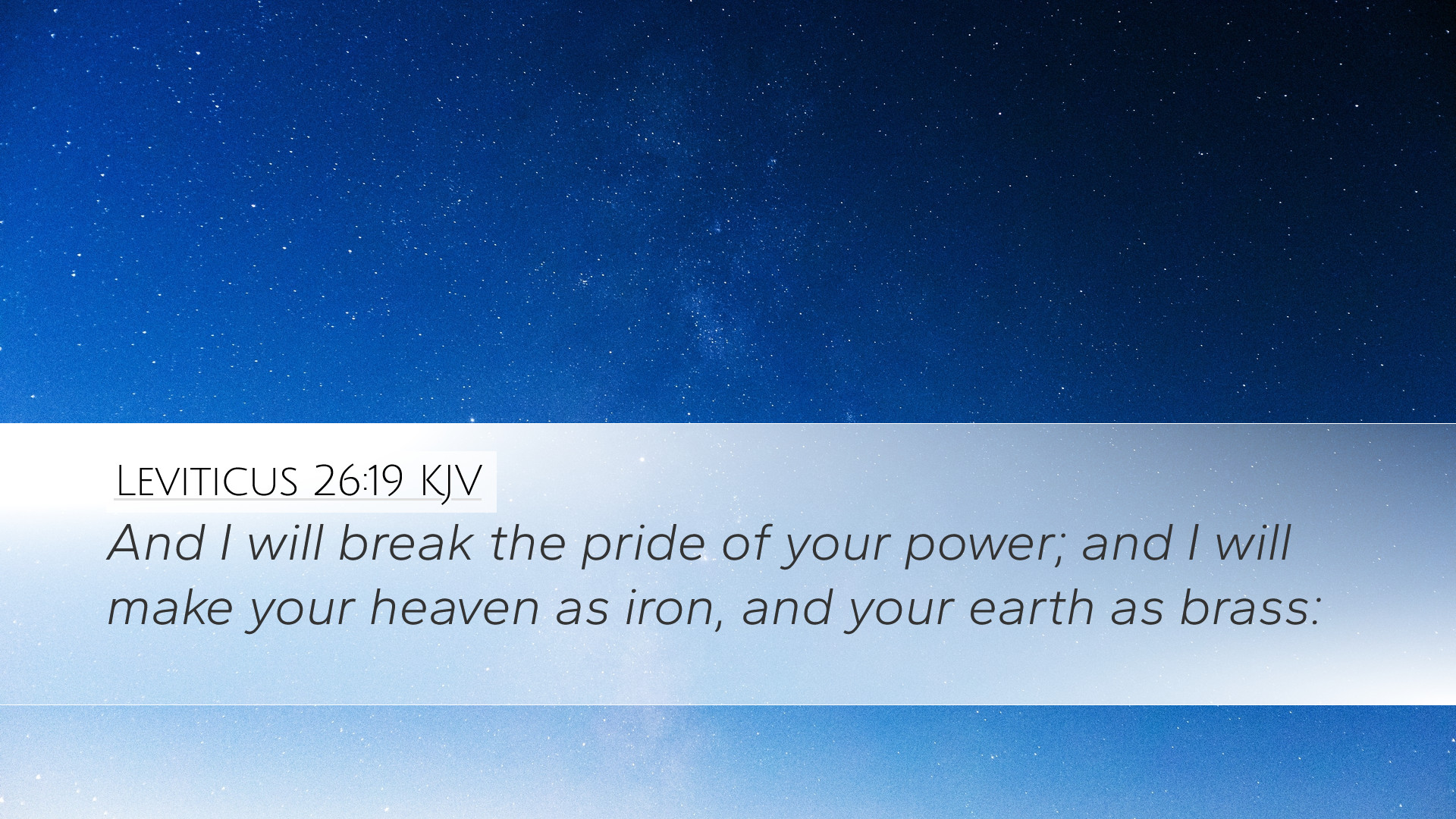Commentary on Leviticus 26:19
Leviticus 26:19 states:
"And I will break the pride of your power; and I will make your heaven as iron, and your earth as brass."
This verse encapsulates a profound statement regarding God's sovereignty and the reality of divine judgment, particularly in the context of Israel's covenant obligations. Here, we explore the theological implications of the verse, drawing insights from prominent public domain commentaries including those of Matthew Henry, Albert Barnes, and Adam Clarke.
Contextual Background
The verse is part of a larger discourse in Leviticus 26, wherein God outlines the blessings for obedience and the curses for disobedience. This chapter serves as a crucial reminder of the covenant relationship between God and the Israelites, emphasizing the conditional nature of their blessings based on their faithfulness to God's commands.
Divine Judgment on Pride
Matthew Henry highlights that the pride of power refers to the self-reliance and arrogance that the Israelites might develop as a result of their successes. He notes that when they become proud of their strength and accomplishments, they are in danger of forgetting the source of their blessings—God Himself. God's declaration to "break the pride" serves as a call to humility and recognition of divine sovereignty.
Albert Barnes elaborates on this idea by stating that God’s actions against pride are a means to bring His people back to a place of dependence upon Him. When the heavens become like iron and the earth like brass, it signifies a cessation of God’s favor, leading to spiritual barrenness and physical drought. This stark imagery serves as a powerful admonition about the consequences of turning away from God.
The Consequence of Disobedience
The terms "heaven as iron" and "earth as brass" symbolize the lack of divine blessings and the harshness of life without God's provision. Adam Clarke emphasizes that these metaphors illustrate a state of desolation where prayers go unanswered and the land yields no fruit. This reflects the reality that disobedience leads to a tangible withdrawal of God’s presence—a sober reminder for believers today.
Theological Implications
This verse points to several important theological considerations:
- God’s Sovereignty: The passage affirms God's control over the natural world and His ability to bless or withhold blessing based on human response to His commandments.
- The Role of Human Agency: While God's sovereignty is paramount, humans are responsible for their choices. The blessings and curses reflect the chosen path of obedience versus disobedience.
- The Nature of God’s Discipline: God’s interventions are not merely punitive but corrective, aimed at restoring His people to a right relationship with Him.
Pastoral Applications
For pastors and church leaders, Leviticus 26:19 serves as a vital reminder of the importance of teaching congregations about humility before God. Here are some applications:
- Emphasizing Dependence on God: Encourage church members to recognize their reliance on God for all aspects of life, avoiding the pitfalls of pride.
- Recognizing Consequences: Teach about the nature of sin and disobedience, stressing the serious consequences that can arise when individuals and communities drift from their covenant relationship with God.
- Cultivating a Humble Spirit: Foster an environment in the church that values humility, repentance, and a desire for God’s favor and presence.
Conclusion
In conclusion, Leviticus 26:19 provides rich material for reflection on God’s character, human responsibility, and the consequences of our choices. It serves not only as a warning but as an opportunity for renewal and recommitment to the covenant relationship we have in Christ. As we study this passage alongside the insights of respected commentators, may we better understand the gravity of our actions and the importance of maintaining a humble and obedient heart before our God.


